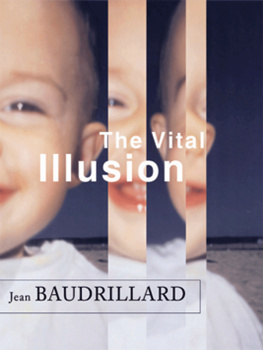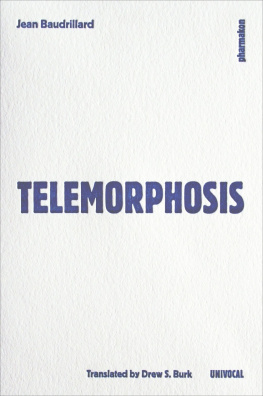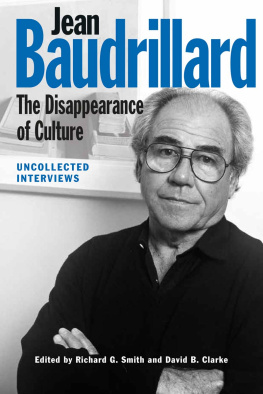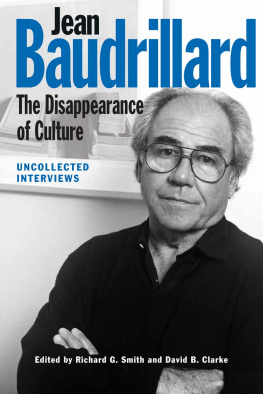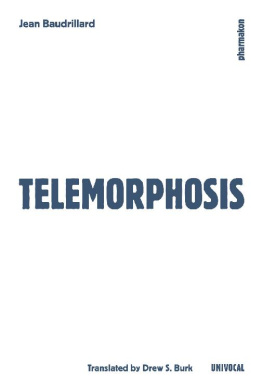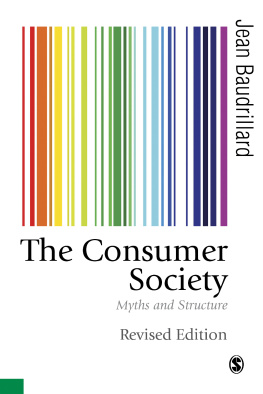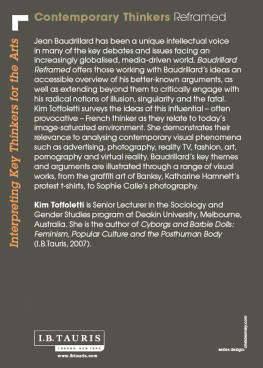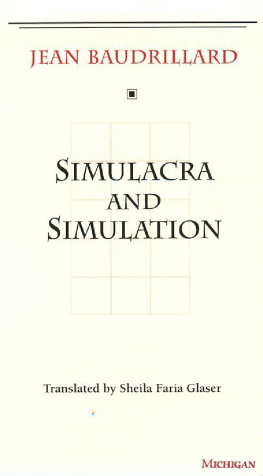THE VITAL ILLUSION
WELLEK LIBRARY LECTURES
EDITORIAL NOTE
The Wellek Library Lectures in Critical Theory are given annually at the University of California, Irvine, under the auspices of the Critical Theory Institute. The following lectures were given in May 1999.
The Critical Theory Institute
John Carlos Rowe, Director
THE VITAL ILLUSION
Jean Baudrillard
Edited by Julia Witwer
Columbia University Press New York
Columbia University Press
Publishers Since 1893
New York Chichester, West Sussex
cup.columbia.edu
Copyright 2000 Columbia University Press
All rights reserved
E-ISBN 978-0-231-50632-8
Library of Congress Cataloging-in-Publication Data
Baudrillard, Jean.
The vital illusion / Jean Baudrillard ;
edited by Julia Witwer.
p. cm(Wellek Library lectures)
Includes index.
ISBN 0-231-50632-8
1. Reality. 2. Virtual reality. 3. Cloning.
I. Witwer, Julia. II. Title. III. Wellek Library lectures at the University of California Irving
BD331 .B287 2000
194-dc21 00-034567
A Columbia University Press E-book.
CUP would be pleased to hear about your reading experience with this e-book at .
CONTENTS
T he question concerning cloning is the question of immortality. We all want immortality. It is our ultimate fantasy, a fantasy that is also at work in all of our modern sciences and technologiesat work, for example, in the deep freeze of cryonic suspension and in cloning in all its manifestations.
The most notorious example of cryonic suspension isnaturallyWalt Disney, but he, at least, being destined for resurrection, is said to have been frozen whole, in his integrity. There are more anomalous situations today. Nowadays, in Phoenix, Arizona (the predestined site for Resurrection), only the heads are frozen, because its from the cells of the brainregarded as the nucleus of individual beingthat researchers hope to reconstitute the deceased in their bodily wholeness. (One cant help but wonder why they dont, in that case, simply preserve a single cell or a DNA molecule.)
To complement these heads without bodies: On the other side of the Atlantic Ocean, headless frogs and mice are being cloned in private laboratories, in preparation for the cloning of headless human bodies that will serve as reservoirs for organ donation. Why bodies without heads? As the head is considered the site of consciousness, it is thought that bodies with heads would pose ethical and psychological problems. Better simply to manufacture acephalic creatures whose organs could be freely harvested, because such creatures would not compete withor invoke too closelythe original human beings.
These, then, are the experimental and artificial forms of cloningnot including Dolly, of course, and the rest of her kind. But spontaneous cloning, and in fact spontaneous immortality, can also be found in nature, at the heart of our cells.
Ordinarily, a cell is destined to divide a certain number of times and then to die. If, in the course of its division, something happens to perturb this processfor example, an alteration in the gene that prevents tumors or in the mechanisms governing cellular apoptosisthen the cell becomes cancerous. It forgets to die; it forgets how to die. It goes on to clone itself again and again, making thousands of identical copies of itself, thus forming a tumor. Normally the subject dies as a result, and the cancerous cells die with him or her. But in the case of Henrietta Lacks, the tumor cells sampled from her body were cultured in a laboratory and will continue to proliferate endlessly. They constitute so remarkable and virulent a specimen that they have been circulated throughout the world and even sent into space, on board the U.S. satellite Discoverer 17. So it is that the disseminated body of Henrietta Lacks, cloned at the molecular level, makes its immortal rounds.

There is something occulted inside us: our death. But something else is hidden there, lying in wait for us within each of our cells: the forgetting of death. In our cells our immortality lies in wait for us. Its common to speak of the struggle of life against death, but there is an inverse peril. And we must struggle against the possibility that we will not die. At the slightest hesitation in the fight for deatha fight for division, for sex, for alterity, and so for deathliving beings become once again indivisible, identical to one anotherand immortal.
Contrary to everything that seems obvious and natural, natures first creatures were immortal. It was only by obtaining the power to die, by dint of constant struggle, that we became the living beings we are today. Blindly we dream of overcoming death through immortality, when all the time immortality is the most horrific of possible fates. Encoded in the earliest life of our cells, this fate is now reappearing on our horizons, so to speak, with the advent of cloning. (The death drive, according to Freud, is precisely this nostalgia for a state before the appearance of individuality and sexual differentiation, a state in which we lived before we became mortal and distinct from one another. Absolute death is not the end of the individual human being; rather, it is a regression toward a state of minimal differentiation among living beings, of a pure repetition of identical beings.)
The evolution of the biosphere is what drives immortal beings to become mortal ones. They move, little by little, from the absolute continuity found in the subdivision of the samein bacteriatoward the possibility of birth and death. Next, the egg becomes fertilized by a sperm and specialized sex cells make their appearance. The resulting entity is no longer a copy of either one of the pair that engendered it; rather, it is a new and singular combination. There is a shift from pure and simple reproduction to procreation: the first two will die for the first time, and the third for the first time will be born. We reach the stage of beings that are sexed, differentiated, and mortal. The earlier order of the virusof immortal beingsis perpetuated, but henceforward this world of deathless things is contained inside the world of the mortals. In evolutionary terms, the victory goes to beings that are mortal and distinct from one another: the victory goes to us.
But the game isnt over yet, and reversion is always possible. It can be found not only in the viral revolt of our cells but also in the enormous enterprise we living beings ourselves undertake today: a project to reconstruct a homogeneous and uniformly consistent universean artificial continuum this timethat unfolds within a technological and mechanical medium, extending over our vast information network, where we are in the process of building a perfect clone, an identical copy of our world, a virtual artifact that opens up the prospect of endless reproduction.
We are in the process of reactivating this pathological immortality, the immortality of the cancer cell, both at the individual level and at the level of the species as a whole. This is the revenge taken on mortal and sexed beings by immortal and undifferentiated life forms. This is what could be called the final solution.
After the great revolution in the evolutionary processthe advent of sex and deathwe have the great involution: it aims, through cloning and many other techniques, to liberate us from sex and death. Where once living creatures strove, over millions of years, to pull themselves free of this kind of incest and primitive entropy, we are now, through scientific advances themselves, in the process of recreating precisely these conditions. We are actively working at the dis-information of our species through the nullification of differences.

